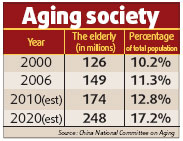The country faces unprecedented challenges in economic and social spheres as a result of a fast expanding aging population, top officials warned yesterday.
With two working people for every retiree between 2030 and 2050, the country is expected to see the end of a decades-long advantage it enjoyed with a low-cost labor market.
Currently, the ratio is 6:1, according to figures from the China National Committee on Aging (CNCA).
"We might encounter the heaviest burden especially after 2030, when the demographic dividend is set to end," said Yan Qingchun, deputy director of the office of the CNCA.
Yan made the forecast yesterday at a press conference to release the latest survey on the aging population. The last one was released in 2000.
According to the survey, 149 million, or 11.3 percent of the population, were above 60 by the end of 2006, about 1.1 percentage point higher than that in 2000.
According to a white paper issued earlier by the CNCA, the aging population is growing at 3.2 percent every year, five times the total population growth. The figure is estimated to reach 248 million in 2020, and 437 billion in 2050, exceeding a quarter of the population then.
"With fewer people of working age and more pressure in supporting the elderly, the economy will suffer if productivity sees no major progress," said Yan.
The country has benefited from the demographic dividend for several decades.
According to Cai Fang, director of the Institute of Population and Labor Economics, about 28 percent of the economic activity in the last two decades can be attributed to this factor.
But now "the country needs to change its growth mode from relying mainly on labor to advanced production methods", said Cai.
Experts have also warned that China might lose the competitive edge in low-cost labor and see major increase in salaries.
The country faces a huge financial strain on medical care and supporting senior citizens, said Zhang Kaidi, director of the China Research Center on Aging.
China is not "adequately prepared" for its rapidly aging population, he said.
For instance, the 1.49 million beds available in various institutes for the elderly accounted for less than 9 percent of the estimated 22.61 million beds needed in 2006, according to a survey.
And in the countryside, more than half of the elderly do not enjoy any medical insurance, and only 4.8 percent of them receive pensions, said the survey.
Despite vast amounts being spent on education, medical care and employment promotion, Zhang called on the authorities to be suitably prepared for a graying society.
(China Daily December 18, 2007)


